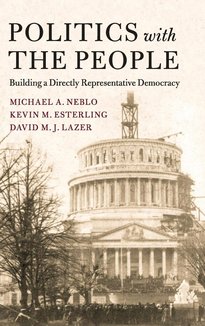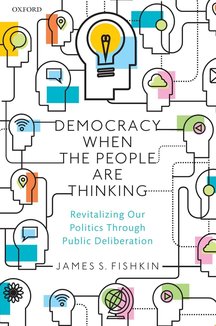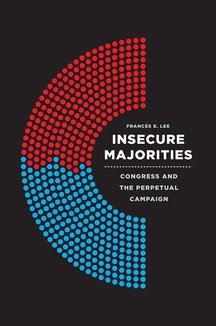Recommended Books

Politics with the People: Building a Directly Representative Democracy (Cambridge Studies in Public Opinion and Political Psychology, Series Number 555)
Authors:
Michael A. Neblo
,
Kevin M. Esterling
,
David M. J. Lazer
ISBN 13:
978-1107117266
Many citizens in the US and abroad fear that democratic institutions have become weak, and continue to weaken. Politics with the People develops the principles and practice of 'directly representative democracy' - a new way of connecting citizens and elected officials to improve representative government. Sitting members of Congress agreed to meet with groups of their constituents via online, deliberative town hall meetings to discuss some of the most important and controversial issues of the day. The results from these experiments reveal a model of how our democracy could work, where politicians consult with and inform citizens in substantive discussions, and where otherwise marginalized citizens participate and are empowered. Moving beyond our broken system of interest group politics and partisan bloodsport, directly representative reforms will help restore citizens' faith in the institutions of democratic self-government, precisely at a time when those institutions themselves feel dysfunctional and endangered.

Democracy When the People Are Thinking: Revitalizing Our Politics Through Public Deliberation
Author:
James S. Fishkin
ISBN 13:
978-0198865186
Democracy requires a connection to the 'will of the people'. What does that mean in a world of 'fake news', relentless advocacy, dialogue mostly among the like-minded, and massive spending to manipulate public opinion? What kind of opinion can the public have under such conditions? What would democracy be like if the people were really thinking in depth about the policies they must live with? If they really 'deliberated' with good information about their political choices? This book argues that 'deliberative democracy' is not utopian. It is a practical solution to many of democracy's ills. It can supplement existing institutions with practical reforms. It can apply at all levels of government and for many different kinds of policy choices. This volume speaks to a recurring dilemma: listen to the people and get the angry voices of populism or rely on widely distrusted elites and get policies that seem out of touch with the public's concerns. Instead, there are methods for getting a representative and thoughtful public voice that is really worth listening to. Democracy is under siege in most countries, where democratic institutions have low approval and face a resurgent threat from authoritarian regimes. Deliberative democracy can provide an antidote and can reinvigorate our democratic politics. Democracy When the People Are Thinking draws on the author's research with many collaborators on 'Deliberative Polling'-a process conducted in 27 countries on six continents. It contributes both to political theory and to the empirical study of public opinion and participation. It should interest anyone concerned about the future of democracy and how it can be revitalized.

Insecure Majorities: Congress and the Perpetual Campaign
Author:
Frances E. Lee
ISBN 13:
978-0226409047
As Democrats and Republicans continue to vie for political advantage, Congress remains paralyzed by partisan conflict. That the last two decades have seen some of the least productive Congresses in recent history is usually explained by the growing ideological gulf between the parties, but this explanation misses another fundamental factor influencing the dynamic. In contrast to politics through most of the twentieth century, the contemporary Democratic and Republican parties compete for control of Congress at relative parity, and this has dramatically changed the parties’ incentives and strategies in ways that have driven the contentious partisanship characteristic of contemporary American politics. With Insecure Majorities, Frances E. Lee offers a controversial new perspective on the rise of congressional party conflict, showing how the shift in competitive circumstances has had a profound impact on how Democrats and Republicans interact. For nearly half a century, Democrats were the majority party, usually maintaining control of the presidency, the House, and the Senate. Republicans did not stand much chance of winning majority status, and Democrats could not conceive of losing it. Under such uncompetitive conditions, scant collective action was exerted by either party toward building or preserving a majority. Beginning in the 1980s, that changed, and most elections since have offered the prospect of a change of party control. Lee shows, through an impressive range of interviews and analysis, how competition for control of the government drives members of both parties to participate in actions that promote their own party’s image and undercut that of the opposition, including the perpetual hunt for issues that can score political points by putting the opposing party on the wrong side of public opinion. More often than not, this strategy stands in the way of productive bipartisan cooperation—and it is also unlikely to change as long as control of the government remains within reach for both parties.